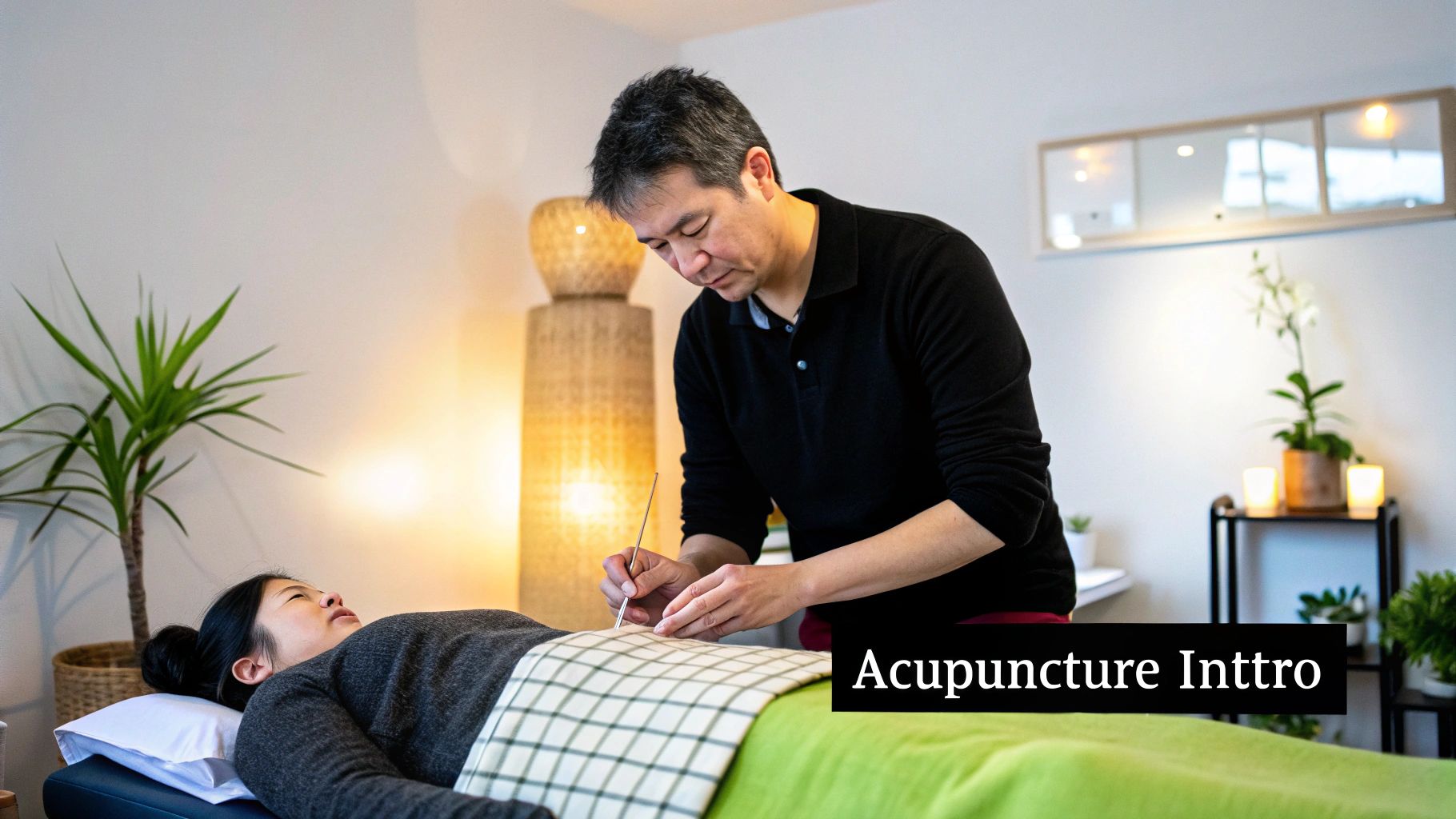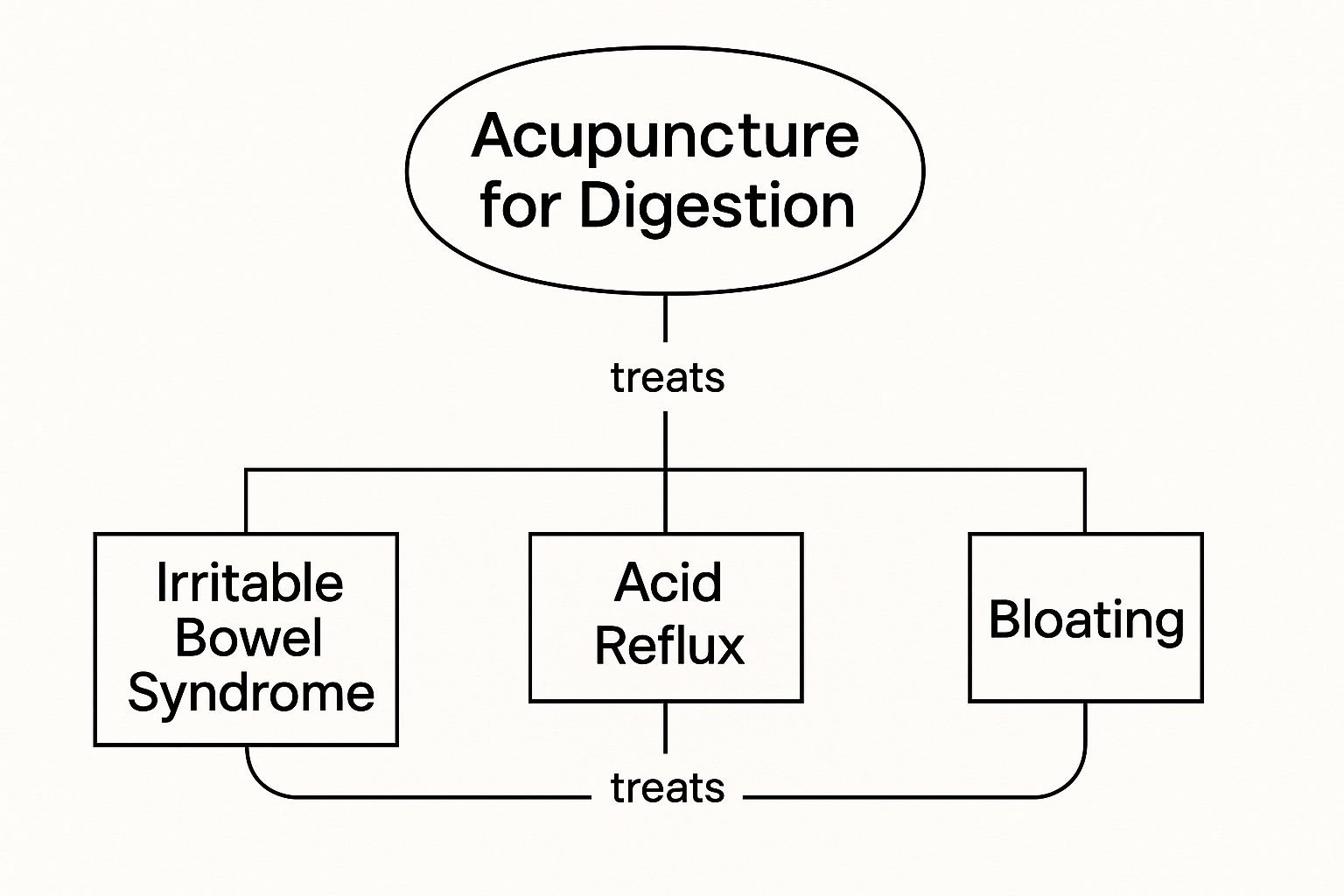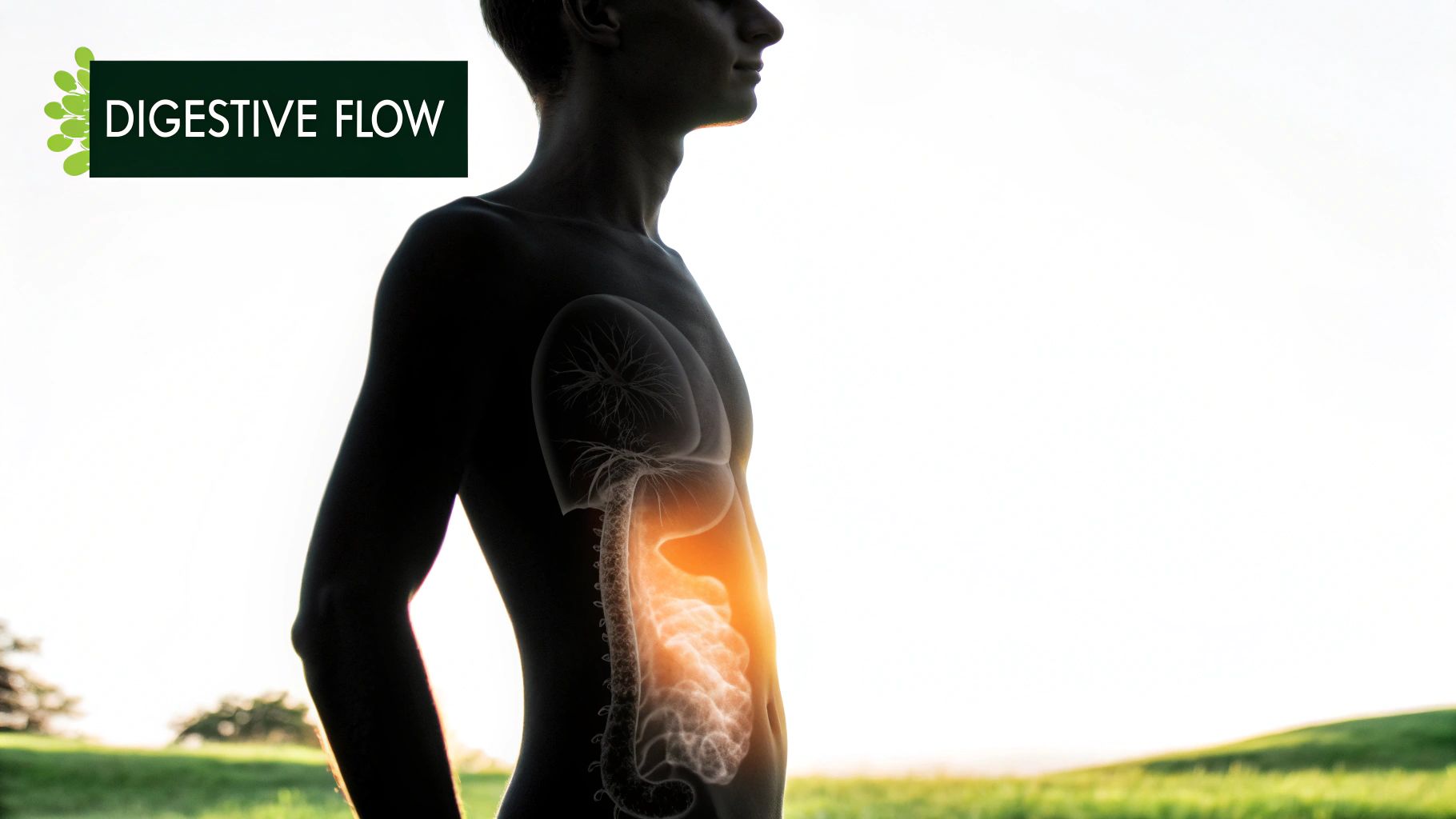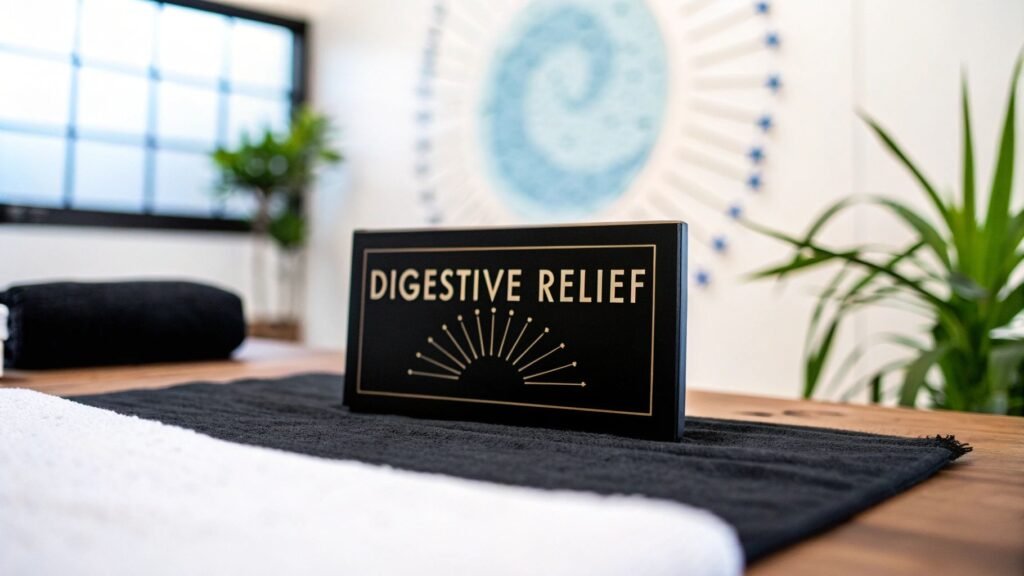If you're grappling with digestive problems like IBS, bloating, or acid reflux, you know how frustrating it is to find something that genuinely works. Acupuncture offers a time-tested path to relief, not by just masking symptoms, but by getting to the root of the problem to regulate your gut and calm inflammation.
Think of it as hitting the reset button on your digestive system.
Your Path to Digestive Relief Starts Here

When your digestion is off-kilter, it feels like it takes over your life. The discomfort, unpredictability, and constant symptoms—cramping, gas, irregular bowel habits—are more than just an inconvenience; they're draining. Maybe you’ve already been down the road of elimination diets, medications, and lifestyle tweaks with little to show for it.
This is often where people turn to acupuncture for digestive issues, looking for a different angle. It’s an approach that looks beyond the symptoms to address the underlying cause of the distress.
In Traditional Chinese Medicine (TCM), the body is seen as a whole, interconnected system. Your digestive tract isn't treated like a standalone machine. Instead, it’s viewed as a central hub where your body’s energy, or Qi, is processed. Picture the energy pathways in your body, called meridians, as a complex highway system. When there’s a traffic jam or blockage, everything backs up. Acupuncture works by using incredibly fine needles at specific points to clear that blockage, restoring smooth, efficient flow.
A Modern Approach to an Ancient Practice
Acupuncture isn't new; it has been used to treat gastrointestinal problems for thousands of years. But with an estimated 60 to 70 million people in the U.S. living with digestive diseases, this ancient practice has never been more relevant.
Modern research is now catching up, showing us how it works. We see that acupuncture can regulate gut motility, help protect the stomach lining, and even reduce visceral hypersensitivity—that raw, over-sensitive feeling in your gut. For example, studies show that stimulating a key point like Zusanli (ST-36) directly influences the vagus nerve, which helps restore normal stomach rhythms. You can read more about the research behind these mechanisms to see how it all connects.
This understanding allows a practitioner to create a highly personalized treatment plan that zeroes in on your specific complaints.
Rather than applying a one-size-fits-all solution, acupuncture addresses the unique pattern of imbalance causing your digestive distress. It's a method designed to bring your body back into a state of natural balance and function.
This guide will walk you through how this ancient practice provides targeted relief for the digestive problems we face today. Let's start by looking at some common conditions and how acupuncture helps.
How Acupuncture Targets Common Digestive Complaints
The table below gives you a quick snapshot of how acupuncture's actions are tailored to different digestive problems. It’s not just about placing needles; it’s about prompting a specific, healing response from your body.
| Digestive Issue | Primary Acupuncture Action |
|---|---|
| Irritable Bowel Syndrome (IBS) | Regulates the gut-brain axis to reduce cramping and normalize bowel movements. |
| Acid Reflux & GERD | Helps control stomach acid production and strengthens the esophageal sphincter. |
| Bloating & Gas | Improves Spleen and Stomach function to reduce "Dampness" and move stagnant Qi. |
| Chronic Constipation | Stimulates intestinal motility to promote regular, comfortable elimination. |
| Crohn's & Colitis | Reduces inflammation in the GI tract and helps manage pain and discomfort. |
As you can see, the goal is always to restore proper function—whether that means calming an overactive system, kickstarting a sluggish one, or reducing painful inflammation.
Understanding How TCM Views Your Digestive Health
To understand why acupuncture can be so effective for digestive problems, we first need to look at the body through the lens of Traditional Chinese Medicine (TCM). Instead of seeing a collection of separate organs, TCM views the body as a single, interconnected ecosystem. Everything is powered by a vital life force called Qi (pronounced "chee").
Think of your digestive system as the body's central kitchen. In this kitchen, the Spleen and Stomach are the head chefs. It's their job to take everything you eat and drink, break it down, and convert it into the essential nutrients and Qi your entire body needs to thrive.
When these two "chefs" work well together, your digestive kitchen runs like a well-oiled machine. You feel energetic, have a healthy appetite, and experience comfortable, regular bowel movements. But what happens when the kitchen staff gets overworked and stressed? That’s when things start to go wrong.
The Role of the Spleen and Stomach in Digestion
In TCM, the Spleen isn't just the physical organ recognized in Western anatomy; it’s a functional system that governs the "transformation and transportation" of nutrients. Its partner, the Stomach, handles the "ripening and rotting"—the initial breakdown of food.
- The Stomach is like the cooking pot. It receives the food and starts the process.
- The Spleen then does the delicate work. It extracts the purest essence from the food, turning it into Qi and blood, and then sends this energy out to nourish the rest of the body.
If the Spleen's function weakens—often due to a poor diet, chronic stress, or overthinking—this crucial process falters. The kitchen becomes inefficient, creating a backlog of half-processed food. This is the starting point for many common digestive complaints.
In the world of TCM, a weak gut doesn't just cause stomach aches. It's seen as the root of deeper issues like fatigue, brain fog, and a poor immune response, because the body simply isn't getting the high-quality fuel it needs.
This infographic shows how acupuncture serves as a primary treatment for several common digestive complaints that arise from these imbalances.

As you can see, conditions like IBS, bloating, and acid reflux are directly linked to this core digestive imbalance, which is precisely what acupuncture aims to correct.
When Dampness Clogs the System
When a weakened Spleen can’t properly process food and fluids, a sticky, heavy substance called Dampness can build up in the body. The best way to picture Dampness is as a thick fog that settles in your system, slowing everything down. It's a fundamental concept in TCM for explaining many digestive symptoms.
Common signs of Dampness include:
- A feeling of heaviness, especially in the abdomen or limbs
- Bloating that feels worse after you eat
- Loose stools or diarrhea
- A poor appetite or a sensation of being full very quickly
- A sluggish, foggy-headed feeling, particularly in the morning
This internal "damp" environment is the perfect breeding ground for symptoms. Just as a damp basement invites mold, internal Dampness can manifest as bloating, fluid retention, and even yeast overgrowth.
Acupuncture gets to the heart of the problem by stimulating specific points that strengthen the Spleen, clear out this Dampness, and restore the smooth, easy flow of Qi. In essence, it helps your internal kitchen clean up its act, become more efficient, and get back to its vital job of nourishing you from the inside out. This is how we address the root cause, not just the symptoms.
Key Acupoints for Restoring Digestive Harmony

While understanding the theory behind Qi and Dampness gives us the "why," the real magic of acupuncture for digestive issues happens at specific points on the body. These aren't just random spots; they are potent intersections along the body's energy pathways, or meridians, each with a very specific job to do. A skilled acupuncturist will choose a precise combination of these points to craft a treatment that is as unique as your symptoms.
Think of these acupoints as sophisticated control switches for your digestive system. By stimulating them, we can send targeted signals to calm down inflammation, get your gut motility back on track, and strengthen the core Spleen and Stomach systems. This customized approach is exactly why acupuncture can be so effective for a whole host of problems, from nagging cramps and bloating to persistent nausea.
While we have hundreds of points that can influence digestion, a few are true powerhouses that we turn to again and again. Let's walk through some of the most essential acupoints for getting your gut health back in balance.
The Master Switch for Digestion
If there’s one point that’s famous in the world of acupuncture, it’s Zusanli (ST36). The name translates to “Leg Three Miles,” and it’s located on the Stomach meridian, about four of your own finger-widths below the kneecap and just to the outside of your shin bone. The legend behind the name is that ancient Chinese soldiers would stimulate this point to find the energy to march another three miles, even when they were utterly exhausted.
When it comes to digestion, ST36 is what we consider the master switch for the entire gastrointestinal system. It’s incredibly powerful for building up Qi and blood, fortifying the Spleen and Stomach, and clearing out Dampness. This makes it an indispensable point for treating almost any digestive complaint you can think of.
This single point is a go-to for:
- Boosting overall energy and fighting the fatigue that so often comes with poor digestion.
- Easing abdominal pain, bloating, gas, and feelings of nausea.
- Regulating bowel movements, whether you’re dealing with constipation or diarrhea.
The image below shows you exactly where to find the Zusanli (ST36) point.

Its prime location along the Stomach channel allows it to directly influence the digestive organs. Modern research has even shown that stimulating ST36 can modulate how your stomach moves and how sensitive it is, often through the vagus nerve pathway.
Other Vital Acupoints for Gut Health
Beyond the all-star ST36, your practitioner has a whole toolkit of other important points to draw from. The specific points they choose will tell a story about what your body needs to rebalance itself. A recent analysis of clinical trials actually confirmed what practitioners have known for centuries: a core group of points consistently emerges as the most critical for treating functional gastrointestinal disorders.
Here are a few other superstars we frequently rely on:
- Neiguan (PC6): You’ll find this point on your inner forearm. It is the number one point for relieving nausea and vomiting. It has a profound calming effect on the Stomach and is a lifesaver for everything from motion sickness and morning sickness to the nausea caused by chemotherapy.
- Zhongwan (CV12): Situated right on the midline of your abdomen, about halfway between your navel and the bottom of your breastbone. This point directly targets the Stomach organ itself, helping to soothe stomach pain, acid reflux, and general indigestion.
- Tianshu (ST25): Located on either side of your navel, these points are known as the "Front-Mu" points of the Large Intestine. This makes them absolutely essential for regulating the bowels and incredibly effective for conditions like IBS, constipation, and diarrhea.
These points don’t just work in isolation; they create a synergistic network. By thoughtfully combining them into a personalized prescription, an acupuncturist can craft a powerful treatment designed to re-establish your digestive harmony and bring you lasting relief.
The Science Behind Acupuncture and Gut Health
While the ancient principles of Traditional Chinese Medicine offer a time-tested framework for healing, many people understandably wonder what modern science has to say. How can placing tiny needles into the skin create such a profound change in something as complex as the digestive system?
The answer isn't magic—it's neurobiology. Modern research is increasingly confirming what practitioners have seen in the clinic for centuries. When an acupuncture needle stimulates a specific point, it's not just moving some abstract energy. It's sending a very real signal through your body's intricate network of nerves, directly to your spinal cord and brain.
This is where the connection to digestive health becomes so clear. Many common gut problems, like Irritable Bowel Syndrome (IBS), aren't just about the stomach or intestines; they're rooted in a miscommunication between the gut and the brain. Acupuncture steps in to act as a master regulator for that conversation, helping to reset the connection and restore order.
Modulating the Gut-Brain Axis
One of the most powerful ways acupuncture helps the gut is by influencing what scientists call the gut-brain axis. Think of this as a constant, two-way communication superhighway between your gastrointestinal tract and your central nervous system. It’s the command center that controls everything from muscle contractions to hormone release in your gut.
Ever felt butterflies in your stomach before a big event? That's the gut-brain axis in action. When you're stressed, your brain sends "fight or flight" signals down this highway, which can easily throw your digestion into chaos.
Acupuncture essentially applies the brakes to that stress response. By stimulating specific points, it activates the parasympathetic nervous system—your body's "rest and digest" mode. This calming effect has a cascade of benefits:
- It reduces visceral hypersensitivity. This is a major issue in conditions like IBS, where the nerves in the gut are overly sensitive and perceive normal digestion as painful. Acupuncture helps turn down the volume on these pain signals.
- It regulates gut motility. For people with constipation, it can help get things moving. For those with diarrhea, it can slow things down. It helps your body find its natural rhythm.
- It decreases inflammation. Research shows that acupuncture can trigger the release of the body's own anti-inflammatory chemicals, which is critical for managing conditions like Crohn's or colitis.
The real beauty of acupuncture is that it doesn't force the body to do anything unnatural. It simply prompts your own nervous system to do its job better, guiding it back to a state of balance and healthy function.
What Modern Imaging Reveals
For years, the effects of acupuncture were difficult to measure with conventional tools. But with the advent of advanced technology like functional MRI (fMRI), we can now literally see what’s happening inside the brain during a treatment. We finally have a window into the process.
Recent clinical research provides compelling, quantitative evidence of how acupuncture works for functional gastrointestinal disorders. These brain scans show that stimulating acupuncture points changes the activity in key areas that process gut sensations and emotions—regions like the insula, prefrontal cortex, and amygdala. You can dive deeper into these detailed neuroimaging findings from this groundbreaking research.
This isn't just a placebo effect. When you get acupuncture for digestive issues, you are initiating measurable, physiological changes that calm overactive nerve signals and restore healthier function from the top down. It's where ancient wisdom and modern science meet, providing a clear explanation for why this therapy brings relief to so many.
How Acupuncture Can Influence Your Gut Microbiome

One of the most exciting frontiers in health research today is the gut microbiome—that bustling community of trillions of bacteria calling your digestive tract home. A great way to think about your gut is as a complex, vibrant garden. For this garden to truly flourish, it needs a healthy balance of beneficial bacteria (the "good plants") and just a few of the less helpful microbes (the "weeds").
When this delicate ecosystem is in harmony, digestion runs smoothly, you absorb nutrients properly, and your immune system stays strong. But things like chronic stress, a poor diet, or illness can throw this balance off, letting the "weeds" take over. This imbalance, known as dysbiosis, is tied to a whole host of digestive problems, from bloating and gas to more serious inflammatory conditions. It turns out that acupuncture for digestive issues might just act like a master gardener for this internal ecosystem.
Rebalancing Your Inner Garden
Acupuncture does more than just chase symptoms; it seems to influence the very environment where your gut bacteria live and thrive. By stimulating specific acupoints, we can help regulate the pace of your digestion (what we call gut motility) and dial down systemic inflammation. These shifts create a much more welcoming home for beneficial bacteria, encouraging them to multiply while discouraging the troublemakers.
This rebalancing act is profoundly important. A healthier microbiome leads directly to a stronger gut lining, which is crucial for preventing toxins from leaking into the bloodstream—a condition many people know as "leaky gut." By fostering a healthier internal environment, acupuncture's benefits reach far beyond the digestive tract, potentially improving everything from your mood to your overall immunity.
Scientific Insights into Microbiome Regulation
This isn't just a traditional theory; modern science is starting to connect the dots. Animal studies have shown that acupuncture can directly modify the gut microbiota, which is often out of balance in digestive and metabolic diseases. For instance, one compelling study found that acupuncture performed three times a week for eight weeks didn't just reduce body weight and fat in rats on a high-fat diet—it also positively reshaped their gut bacteria. This research helps explain how a therapy with virtually no side effects can influence digestive health on such a deep, systemic level. You can read more about the findings on microbiota regulation in the full study.
This growing body of evidence suggests acupuncture’s role in managing digestive health is multifaceted. It doesn't just calm symptoms—it helps to cultivate a healthier, more resilient internal ecosystem from the ground up.
By supporting the gut-brain axis and now, potentially, the gut microbiome itself, acupuncture offers a layered approach to restoring digestive harmony. The key benefits of this microbial rebalancing include:
- Reduced Inflammation: A balanced microbiome is essential for keeping gut inflammation in check, which is a game-changer for managing conditions like IBD.
- Improved Nutrient Absorption: Healthy gut bacteria are workhorses, helping to break down food so your body can absorb essential vitamins and minerals.
- Enhanced Immune Function: With a huge part of your immune system located in your gut, a balanced microbiome is your first line of defense against pathogens.
This ability to influence the gut microbiome is another powerful way acupuncture works to bring lasting relief and promote genuine, long-term digestive wellness.
What to Expect on Your Acupuncture Treatment Journey
Stepping into a new kind of treatment can feel like a mix of excitement and nerves. If you're looking into acupuncture for digestive issues, knowing what the process actually looks like can make all the difference, helping you feel comfortable and confident from the very start. The entire experience is designed to be gentle, relaxing, and focused completely on you.
Your first appointment is the most in-depth, as it’s where we build the foundation for your healing. This isn't just a quick review of your symptoms. It's a comprehensive look at your overall well-being. I'll ask detailed questions not just about your digestion, but also your sleep patterns, energy, stress levels, and diet. I’ll also likely check your pulse and look at your tongue—two cornerstone diagnostic methods in TCM that give us a surprisingly clear map of what’s happening inside your body.
The Treatment Experience
Once I have a clear understanding of your unique situation, the acupuncture itself begins. I'll have you get comfortable on a treatment table, and I will select specific points chosen just for you. For a closer look at what goes on in the treatment room, you can explore our guide on how to prepare for your first acupuncture session.
One of the first questions I always get is, "Does it hurt?" It's a fair question! But acupuncture needles are incredibly fine—about as thin as a strand of hair. You might feel a tiny, fleeting prick as the needle goes in, but it's nothing like getting an injection.
Many people describe a dull, heavy, or gentle tingling sensation around the needle. This feeling has a name: "de qi." It’s actually a great sign, indicating that your body's energy is responding and the treatment is taking effect.
After the needles are placed, you’ll simply rest for 20-30 minutes. This is often the best part. Most of my patients find this time to be deeply relaxing, sinking into a peaceful, meditative state or even dozing off for a quick nap.
Setting Realistic Expectations for Results
Restoring digestive wellness is a process, not an overnight fix. Consistency is your best friend here. While some people feel a noticeable shift after just one or two sessions, more chronic or stubborn digestive problems usually need a series of treatments to create real, lasting change.
Here’s a typical timeline to give you an idea:
- Initial Phase (1-2 times per week): We start here to actively correct the core imbalance. The goal is to get your symptoms—like bloating, pain, or irregularity—under control and start regulating your system.
- Stabilization Phase (Once a week or every other week): As your symptoms improve and your body starts to hold the changes, we can reduce the frequency. This phase is all about solidifying the progress we've made.
- Maintenance Phase (Monthly or as needed): Once your digestion is humming along nicely, occasional "tune-up" sessions are fantastic for maintaining that balance and heading off any future flare-ups before they start.
We'll work together to create a personalized schedule and I’ll give you a realistic timeline based on your specific condition and how you respond. Think of this as a partnership, one aimed at bringing your digestive system back into harmony and truly improving your quality of life.
Common Questions About Acupuncture for Digestion
Deciding to try a new therapy always brings up questions. It's completely natural. When you're thinking about acupuncture for digestive issues, you deserve to feel confident and clear on what's involved before you even step into the clinic.
This section tackles the most common questions we hear from patients just like you. We'll cover the practical side of things—safety, how quickly you might see results, and what to expect—so you can feel fully informed and at ease.
Is Acupuncture Safe for Digestive Problems?
Yes, absolutely. When performed by a licensed and qualified practitioner, acupuncture is an exceptionally safe therapy with very few side effects. It’s a natural approach that works with your body, encouraging its own innate ability to heal.
The most important safety measure is the use of sterile, single-use needles. This is the mandated standard for all licensed acupuncturists in the United States, and it completely eliminates any risk of infection, ensuring your treatment is always hygienic.
How Quickly Will I See Results?
This is the big question, and the honest answer is: it varies. Every person's body and condition is unique. Some people report feeling a tangible difference in symptoms like bloating or abdominal pain after just one session. That's always a great start.
For others, especially those dealing with chronic or more complex issues, it might take a series of 6-8 treatments to build momentum and achieve significant, lasting relief. During your first visit, we'll map out a personalized treatment plan and give you a realistic idea of what to expect. Consistency, especially early on, is what helps your body learn and hold onto a new, healthier balance.
For a deeper dive into the session-by-session experience, you can learn more about what to expect during acupuncture sessions.
Can I Combine Acupuncture with My Current Medical Treatment?
Definitely. In fact, acupuncture works beautifully as a complementary therapy. It can be safely integrated with conventional medical care for conditions like Crohn's disease, ulcerative colitis, or IBS. Many patients find it helps manage the symptoms that their medications don't fully resolve, and it can even help reduce the side effects of certain drugs.
The key is communication. It's crucial to keep all your healthcare providers in the loop. Let your primary doctor know you're receiving acupuncture, and be sure to tell your acupuncturist about all medications and treatments you're undergoing.
This kind of collaborative care ensures you get the best of both worlds, safely and effectively.
What Can I Do to Support My Treatments at Home?
What you do between sessions can make a huge difference. Your acupuncturist will likely give you some personalized dietary and lifestyle tips based on your specific Traditional Chinese Medicine diagnosis.
Following this guidance is one of the most powerful ways to accelerate your healing. These are often simple, intuitive adjustments:
- Dietary Tweaks: This commonly involves avoiding cold, raw, or overly greasy foods, which can tax the digestive system (or "weaken the Spleen" in TCM terms) and create more internal dampness.
- Stress Management: Simple practices like mindful breathing, meditation, or even a quiet walk can soothe the nervous system and strengthen that critical gut-brain connection.
- Gentle Movement: Activities like Tai Chi or Qigong are fantastic for promoting the smooth flow of Qi and blood, preventing the stagnation that often underlies digestive complaints.
Taking these small steps at home makes you an active partner in your own health journey, empowering you to reclaim your digestive wellness.
At Eric Tsai Acupuncture and Herbs, we are dedicated to helping you find lasting relief from digestive discomfort. To begin your journey toward better gut health, book your consultation today.

